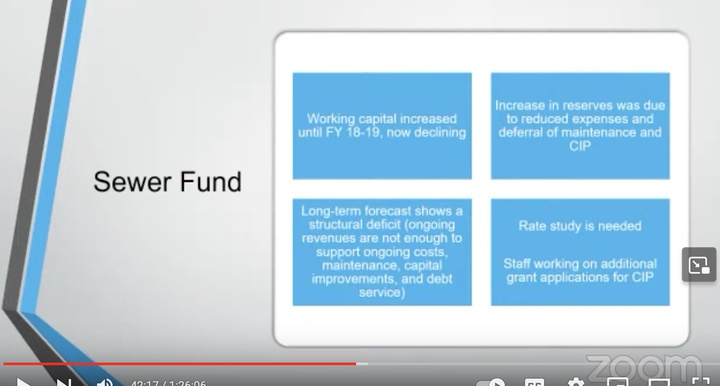Jessica Cejnar Andrews / Thursday, June 8, 2023 @ 3:48 p.m. / Infrastructure, Local Government
With Its Projected Working Capital Expected to Decrease, A Sewer Rate Study Is Planned for Crescent City; Councilors Adopt 2023-24 Budget

In her presentation, Crescent City Finance Director Linda Leaver said long-term sewer fund projections showed a structural deficit. | screenshot
With the sewer fund’s projected working capital dwindling to $1.7 million at the end of the 2023-24 fiscal year, Crescent City will soon conduct a rate study, its finance director told councilors Monday.
For the last six to eight years, Crescent City has restructured a state loan to get the interest forgiven and has been pursuing grants for a number of sewer projects, Leaver said. However its working capital has been decreasing for the last roughly two years, she said.
“The long-term forecast shows that our ongoing revenues are not sufficient to meet the ongoing expenses — the debt and capital needs,” Leaver said. “We are working on addressing that through a rate study and grant funding.”
Staff will also bring a water rate study before the Crescent City Council in the next two months, City Manager Eric Wier said. He said he expects to have a sewer rate study before the City Council in the fall.
Crescent City councilors unanimously adopted the city’s 2023-24 budget on Monday.
In her staff report, Leaver said the city hasn’t increased sewer rates since 2014 despite conducting a rate study in 2015 that recommended increases. Crescent City had gone through the required Proposition 218 process at the time.
That process allows property owners to potentially stop a rate increase, but there weren’t enough protests in 2015. A referendum on the 2016 ballot halted that increase, according to Leaver’s staff report.
“Staff has worked to stabilize this fund on multiple fronts, including restructuring the (wastewater treatment plant) loan, contracting operations to Jacobs Engineering and revising and deferring capital improvements and major maintenance,” Leaver wrote.
Grant revenues are expected to fluctuate, though the sewer fund’s revenue projections for the 2023-24 fiscal year are expected to be stable.
According to Leaver’s presentation, the proposed 2023-24 budget for the city’s sewer fund includes revenues of $5.2 million, a decrease from this year’s estimated budget of $5.3 million.
Operating expenses for 2023-24 are expected to be about $4.5 million. The total budget for capital improvement projects in the sewer fund in 2023-24 is about $1 million and the city’s debt service is $1.6 million, according to Leaver.
About $1 million in capital improvement projects budgeted for in the 2022-23 fiscal year are being rolled over to the 2023-24 fiscal year, according to Leaver.
During her presentation, the news Leaver shared concerning the water fund was similar to the sewer fund. Both are enterprise funds with user fees covering the ongoing cost of providing services.
Working capital in the water fund is projected to decrease to about $1.5 million by the end of the 2023-24 fiscal year. The water fund’s projected expenses include about $2.2 million in capital improvement projects as well as a debt service expense of about $175,000.
Overall operating expenses are projected to be $2.8 million, while revenues are projected to be $3.4 million. According to Leaver’s staff report, those revenues increased because of grant funding for capital projects such as a water tank replacement on Amador Street.
Crescent City hasn’t increased water rates since 2017, according to the staff report.
Leaver’s budget presentation comes as Del Norte County considers a sewer rate increase for customers in the County Service Area outside city limits.
The Board of Supervisors on April 25 started the Proposition 218 protest process. County Engineer Jon Olson told supervisors that rate increases were necessary to avoid a deficit in the County Service Area operating and maintenance budget.
During Leaver’s presentation, Councilor Kelly Schellong asked if Crescent City was communicating with Del Norte County. Crescent City handles operation and maintenance for the county’s portion of the sewer system with the county collecting the fees and passing it on to the city to pay for it.
In the general fund, Crescent City’s total revenues for the 2023-24 fiscal year are expected to be $9.7 million while expenditures are just over $11 million, Leaver said. That would leave a net negative of about $1.3 million, which would be covered by this year’s projected ending fund balance of $3.8 million, according to Leaver’s staff report. However, she said the actual results won’t be known until after the fiscal year ends June 30.
“At our last audit, the fund balance was just over $4 million. We’re estimating when we wrap up this fiscal year, we’ll be at $3.8 million,” she said. “If you roll in what we’re budgeting for next year, if everything got fully spent, that would bring our ending fund balance to about $2.4 million.”
If Crescent City’s general fund expenses came in at 5 percent under budget, its ending fund balance in 2023-24 would be a projected $2.9 million, though about $400,000 would “belong to Measure S” — the city’s 1 percent voter-approved sales tax, which helps fund the fire department, police department, street repairs and swimming pool.
“We don’t want to include that in these calculations, which leaves us just under $2.4 million, which is required as far as 25 percent of our operating reserves,” she said, adding there’s about $107,000 in unallocated funding this fiscal year. “Those numbers will be updated when we have our current fiscal year actual results. And we’ll see how close we are to that $3.8 million estimated balance.”
Crescent City’s major revenue sources for the general fund are sales tax, the additional 1 percent sales tax from Measure S and transiency occupancy taxes, or lodging taxes. According to Leaver’s staff report, revenue projections for 2023-24 include $2.1 million in sales tax; $2.3 million in Measure S dollars and $1.7 million in TOT.
CLICK TO MANAGE